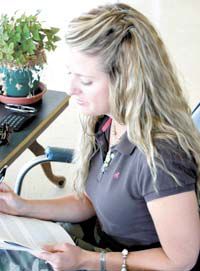Due to a national focus on children with academic and learning difficulties, federal funding for gifted and talented programs has been decreased to the point where it is no longer existent.
Because of the decrease in funding, the Carbon Association for Gifted Children is in danger of losing its small program for the coming school year.
“Kids who are gifted sometimes feel so different on the inside that they end up having more problems than the children with disabilities,” said association president Brandee Fausett. “If the national slogan is no child left behind, then why are we leaving our gifted behind?”
Carbon School District has operated gifted programs in two elementary schools for the last eight to 10 years. The programs at Sally Mauro and Creekview have benefited hundreds of children by enriching educational opportunities while helping develop character, according to Fausett.
In years past, the students participating in the programs have improved vocabularies by learning Greek root words and developed leadership abilities while researching along with building mock civilizations, noted Fausett. The students have also gained knowledge of Shakespeare’s works while studying and conducting plays.
“These children have had countless educational opportunities within this program and if we do not get some funding, we simply will not have a program next year,” explained Fausett.
During the last few years, Carbon district has struggled to maintain funding for the programs, indicated the association president.
Because of No Child Left Behind, the current educational focus has been on children who are struggling to keep up.
Fausett pointed out that the federal mandate is helping many students attending schools in the district, but stressed that the directive has not allowed funding for children on the other side of the spectrum.
The shortage in funding has caused the members of the Carbon association to redouble the group’s efforts when it comes to funding and even expanding the program.
“We feel it is prudent to do what we can to maintain and, if possible, expand the gifted programs within our district. And after speaking with superintendent Patsy Bueno, we have come up with a plan,” explained Fausett.
The association will seek the necessary revenues to operate the programs through fundraising activities and appealing for private donations.
The group plans to go after enough money to maintain the equivalent of one and one-half full-time teachers who would travel to the district’s five elementaries to implement gifted and talented programs the schools.
Data supporting the continuation of gifted programs is compeling.
“In America, we often make fun of our brightest students, giving them such derogatory names as nerd, dweeb or, in a former day, egghead. We have conflicting feelings about people who are smart and we give conflicting signals to our children about how hard they should work to be smart. As a culture, we seem to value beauty and brawn far more than brains,” commented Linda Kreger Silverman, Ph.D., in The Gifted.
According to A Nation at Risk report compiled by the national commission on excellence in 1984, more than one-half the population of gifted students in the United States failed to match tested abilities with comparable achievement in school.
One decade later, the findings of the nationwide report were more disturbing.
“Compared with other top students in other industrialized countries, American students perform poorly on international tests, are offered a less rigorous curriculum, read fewer books, do less homework and enter the work force or postsecondary education less well prepared,” stated the 1994 report.
Additional findings reported in the document included:
•The regular school curriculum does not challenge gifted and talented students.
•Most academically talented students have already mastered up to one-half of the required curriculum offered in elementary school.
•Classroom teachers do little to accommodate the different learning needs of the gifted students.
•Most specialized programs are available for only a few hours per week.
“It is misguided to believe that holding back the brightest students magically helps the slower ones. Bringing the top down does not bring the bottom up,” indicated Silverman
According to Fausett, Carbon School District is in danger of losing the available specialized program hours.
“These children are our future leaders, scientists, authors and physicists. We hope that you find there educational needs as important as we do,” wrote Fausett in a donation request letter drafted for the association.
Association strives to maintain local gifted, talented programs

